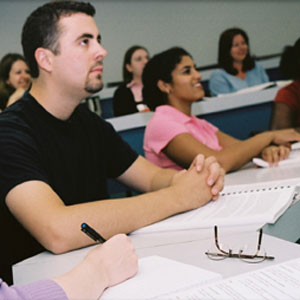 |
| (Abriel photo) |
In the first week of May, 270 faculty members, educational developers, and graduate students from universities across Canada and the U.S. met at Dalhousie to celebrate the tenth anniversary of the Dalhousie Conference on University Teaching and Learning. The theme of the conference this year was "The Scholarship of Teaching and Learning: Enhancing Learning Through Inquiry." Participants were encouraged to approach teaching and learning with the same critical, problem-solving eye that they bring to their disciplinary research.
To celebrate the tenth year of this conference, the Centre for Learning and Teaching partnered with McGraw-Hill Ryerson who sponsored a number of conference events, including three keynote speakers who directed their attention to various facets of scholarly teaching. Shannon Murray (English, University of Prince Edward Island), used a variety of humorous relationship metaphors (e.g. one-night stands, shared custody, and marriage) to convince participants of the importance of making our teaching public by sharing with colleagues in the design, practice, challenges and triumphs of teaching and learning. She enthusiastically outlined the various ways that faculty can teach together and create learning communities both for their students and for themselves.
There was a hush in the auditorium as historian Ken Bain (Teaching and Learning Resource Center, Montclair State University) opened day two of the conference with a compelling keynote on his own research on the central qualities of good teaching. At the heart of the best classroom experiences, he argued, are opportunities for students to question their models of reality. "Does your course change the way your students think?" he asked. He also encouraged us to remember that deep learning can only take place when students are motivated to learn by the "power and intrigue of the questions you ask."
Randy Bass (Center for New Designs in Learning and Scholarship, Georgetown University) closed the conference by presenting the idea that teacher scholars need to bring together their experiences as experts and the needs of the novice learner. Instead of asking students to mimic the scholarly products of experts, he said, we need to help students make the transition from novice to expert through a series of graduated learning experiences. In doing so we will promote deeper learning experiences and highlight for students the importance of both content and process in our disciplines.
Interactive discussion
All three speakers actively engaged their audiences by opening the floor to discussion, asking questions, and providing opportunities for participants to share and debate. The speakers also modeled a variety of teaching styles using humour, PowerPoint, free-flowing dialogue, and video clips to communicate their messages and draw in their audience.
Conference workshops and presentations addressed numerous aspects of the scholarship of teaching and learning including: professional school education, new technologies, assignment design and evaluation, service learning, socio-dramatic pedagogy, sharing circles, and inquiry learning. Presentations described a variety of programming initiatives, such as: an undergraduate teaching assistant training program, a survey course in teaching and learning, the ethics of practitioner research, student opinion surveys, and a new degree program.
Presenters reflected the different approaches educators take to the practice of scholarship of teaching and learning, sharing the results of what had worked in their classrooms, reflecting on how they had learned from the literature and incorporating new ideas into courses or curriculum. Presenters also reflected on their own experiences of becoming researchers in higher education (in their discipline and beyond) and their resulting data and publications.
Creating exceptional teaching environments
The conference called not only for more recognition to be given to teaching and learning across campuses, especially at times of hiring and granting tenure and promotion, but also highlighted the importance of the scholarship of teaching and learning in creating exceptional teaching environments and more successful learning outcomes. Presenter Shelagh Crooks (Philosophy, St. Mary's University) suggested that universities could create Scholarship of Teaching and Learning units to facilitate this goal. A participant in this session suggested instead a Faculty or Institute of Scholarship of Teaching and Learning to which faculty members could become adjunct professors - serving their discipline and the teaching and learning community in visible, meaningful and recognized ways - and making the scholarship of teaching and learning central, not peripheral, to academic life.
Speakers and session facilitators created much food for thought as participants interacted at lunches, informal breaks, and a lively wine and cheese event (complete with jazz band). A scholarly teaching and learning community amongst faculty and across the disciplines emerged before our eyes. Conference attendees gained new insight and were inspired with new ideas to take back to their classrooms. Some created partnerships and communities that will extend beyond the classroom, to curriculum development, inter-departmental innovation, and cross-university collaborations.
Staff members at the Centre for Learning and Teaching thank all participants for their contributions and hope that this successful event will foster the development of the Scholarship of Teaching and Learning in the years to come.
